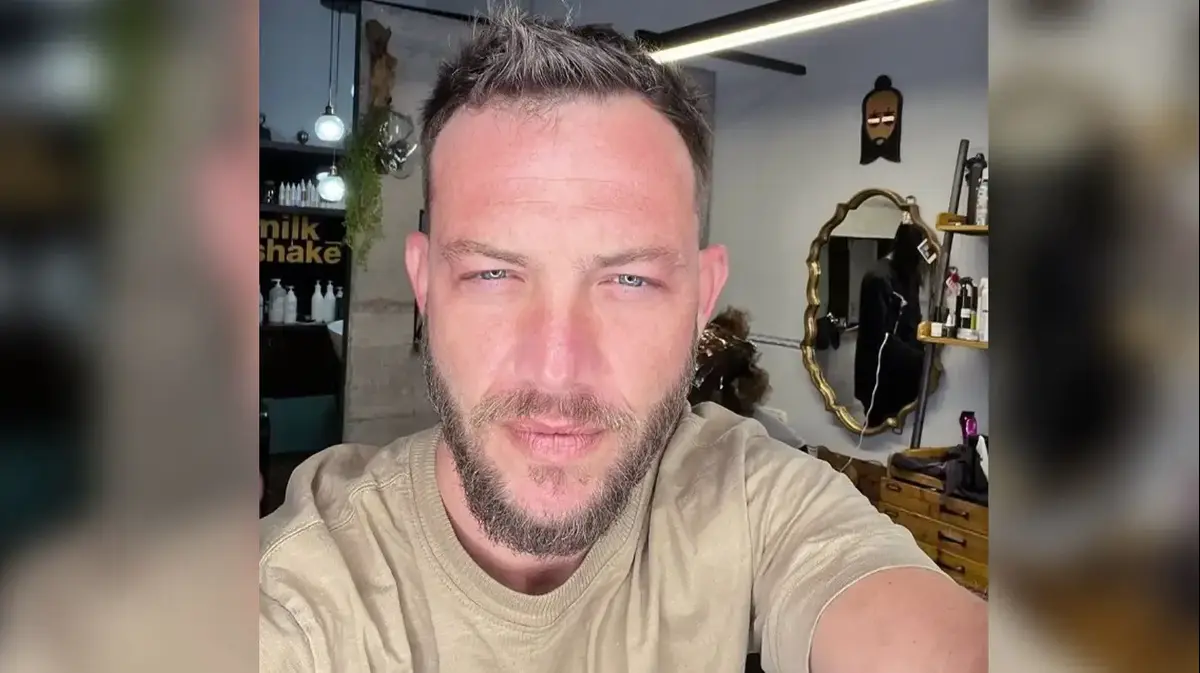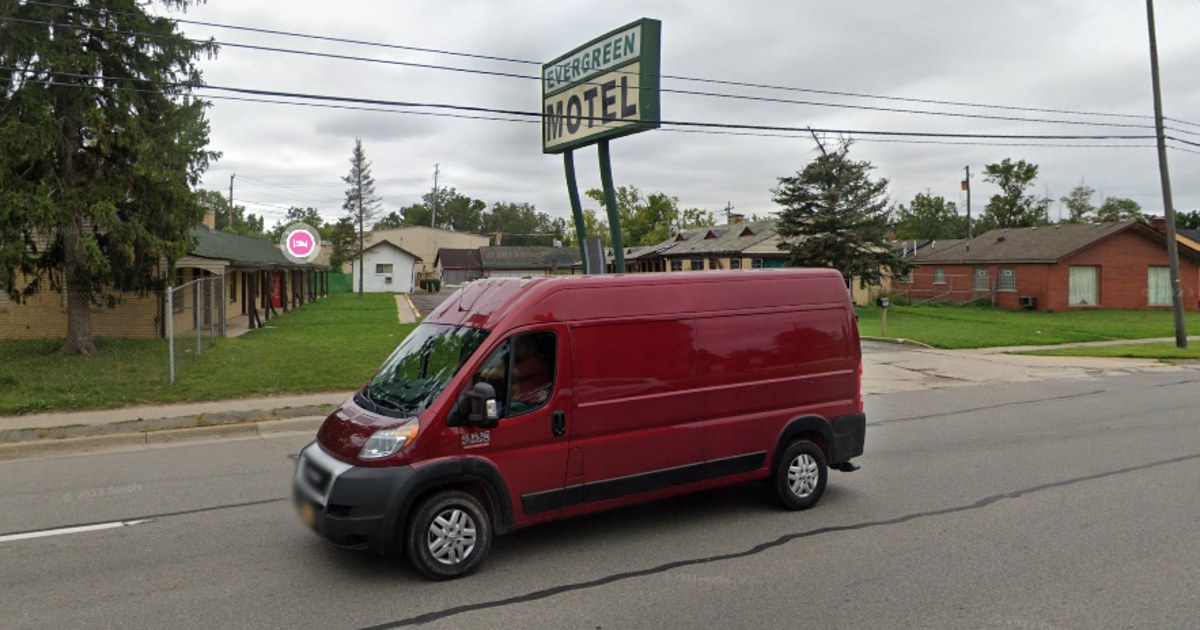Editor's Note: Listen to CNN Pop Zone on Apple Podcasts or Spotify , subscribe and share with your friends.
(CNN Spanish) - Pau Donés, the leader and vocalist of Jarabe de Palo, died this Tuesday at the age of 53.
In 2017, Zona Pop CNN spoke with Donés, two months after he announced that the cancer that was diagnosed in 2015 had returned.
Jarabe de Palo was performing on April 11, 2017 at Smith's Olde Bar, near downtown Atlanta, a bar that has featured legendary artists such as David Bowie or the Californian rock band Red Hot Chili Peppers. The presentation was part of “50 palos”, a project that included a book with 50 personal anecdotes from Donés, a disc with classic themes from the band, but in a very crude format, with strings, piano and voice, and an intimate tour and personal, with which he wanted to establish a direct conversation with his audience. Donés and his group had returned to the stage after 2 years of absence with an appearance at the Vive Latino festival in Mexico in March.
MORE: 5 songs to remember Pau Donés, singer of the band Jarabe de Palo
Relive the CNN Pop Zone conversation with Pau Donés on Apple Podcast, Spotify, Google Podcast or iHeartRadio, or read the transcript below.
Marysabel Huston: Welcome to Zona Pop and CNN en Español Digital. You start a tour around here in the United States. Well they have a few days here. Before coming, you went to Mexico and it meant your return to the stage in two years. How did Vive Latino receive you?
Pau Donés: Exactly. The idea was to start the tour in the United States, which is where I had to leave it by prescription, let's say. In fact, this is how we organize everything to start here, specifically in Phoenix. We had the opportunity to do a Vive Latino and a Pa'l Norte, which are two festivals that were in Mexico just before we started here. And we take advantage of it. Because although I said that the idea was to start here with the “50 sticks” show, we are celebrating, my 50 years and the 20 of Jarabe and that means a slightly more acoustic format and such. We liked the idea of starting with two very strong concerts with many people. But the reality of the matter is that we are starting our tour here in the United States, we have already thought there are nine concerts. We now have four more. We will return in June again to do the northern part of the east coast and then in November, the entire West Coast .
Marysabel Huston: You said in your blog, on the page, that the scenarios give you great enthusiasm and recharge you a lot. How do you feel when you touch, that your foot steps on a platform, physically what do you feel?
Pau Donés: It is very difficult to explain that. The stage is something that is very ... it's like a roller coaster ride, right? One of those that are in the Disney park, or in the Universal park that when you get off they tell you, what happened to you? I don't know, but I loved it. The scenario causes an adrenaline rush, an endorphin rush. You are screaming for two hours, because singing is nothing but screaming, and screaming is like crying or laughing ... imagine if you were two hours laughing or crying. So the sensations ... I have a hard time explaining, but it is very pleasant, it causes a lot of pleasure. Pleasure to the people who listen to you but pleasure to those who are on stage. And it is a very addictive pleasure. So, I was there for two years or I have been without a stage for two years because they advised against it, let's say. But, now we have started again and it was just coming from the operations, it was a little more slack.
I realized that this is what I needed. If something depended on recovery apart from other things, taking care of myself a little more and such, but it was this, going on stage and feeling all that discharge said of adrenaline, or endorphins that makes me feel so good.
Marysabel Huston: The album is also called 50 Palos and it is a compilation album with songs that you have covered super clean, perhaps very acoustic, in some way and an unpublished one, what led you to record these clean versions?
Pau Donés: Look 50 sticks is a project. It consists of a disc, a book and a tour. The book, I will start with the easiest has to do with me with my 50 years, 50 little stories, 50 little anecdotes, ideas, thoughts, opinions, that I wanted to share with people. Curiously, today we are going to finish all the ones we bring selling here on tour.
Someone told me the other day you should dedicate yourself to writing, not to music, the music is finished. But, we are selling more books than records in general. It is a book that has a lot to do with me. The album is a double album, with 21 songs from the oldies of Jarabe, plus a new song. 21 songs of the well-known that we have reviewed. We have revised them in the sense of trying to show how they were created with instruments and voice. They are created in a format that is the one that we bring on tour, very small, mainly with a piano and later with string arrangements, double bass, with some percussion, but very clean. We wanted to do something that showed the songs in their purest state and that would transfer it to the stage. On the way back we also thought… we want to be close to people! Make a show where the communication between us and the audience is not only the songs, but there is really a short distance, where there is an emotion. Because the acoustic format, let's say the musical format is what causes it. It is very exciting to hear, I know, 'La Flaca', 'Grita', or any of those songs on piano and voice, it is very mysterious, as well as very exciting. Well, we decided to present ourselves like this, in that format, having certain doubts about how people would receive it from a 'Skinny' voice, 'Scream' on piano, voice and cello. At the moment the result is being great because in addition in the United States we are making rooms where people are standing, then in Spain and Latin America we make theater that is easier, but people are standing and the result is being great. Of the twelve concerts, four have been sold out and the comments of the people - many have been, as a result of what we read on the networks and then what they tell us - are being good.
Marysabel Huston: It's amazing to hear 'Bonito' and how you used to say 'La Flaca' in such a clean song. And that also leads me to this question: do you think there is a crisis of composers?
Pau Donés: No, I don't think there is a confusion. In other words, there are great composers, great musicians. Talent to spare. Every day there are also better schools, every day there is more musical training. Every day there are more ... things to talk about and ideas to communicate. What happens is that there is a lot of confusion because the business goes the other way. The business is no longer interested in creating creation, the business is interested in business pure and simple. And now the groups are designed in the marketing departments, they are designed together with the radio stations, formulas of the 'mainstream' and that is what it sounds like. The confusion comes out there because maybe we would all like to be on that circuit. But you have to think no, that's something else that goes the other way, that's not even music anymore. That consists of a product that must be sold and it does not matter to make a video clip where you can see good pretty girls, who go little by little with little clothes. A musical formula that is repeated over and over again but that works and pa'lante. We must be aware that we are not in it and that it is not important, that we should not be in it. It really is better not to be in that movie. Surely that film is very likely to make the artists who are there very unhappy. But no, I think it is a time for creation and I also confirm it on the internet you can find things of great quality, as I see it.
Marysabel Huston: How do you see the lyrics? You said what is in 'mainstream' sometimes the lyrics are a bit empty.
Pau Donés: The 'mainstream' is horrible. In other words, it is like the musical formula is repeated in the way of writing the lyrics. Well it's a formula that works that seems to like it. It is a formula that makes you move but does not excite you. But it does not matter, maybe it is that we are living in a moment where we are little aware of our emotions of our feelings, being much more aware of having a good car and a good house and a good dress, than feeling good about what we are, or that, enjoy the little things that our most sentimental or spiritual or emotional part gives us.
Marysabel Huston: I want to talk about the book. You were saying in several interviews that I listened while I was preparing, interviews that you had given in Spain, and you said that you write at the time that everyone sleeps. Was that organic, was it born out of nowhere? Or, did you prepare to write at those hours?
Pau Donés: I'm dyslexic, okay? Although writing songs is good for me and I like it, of course, I don't know how I was going to do with the subject of prose. And so I needed to find a time where I could be focused and from 6 to 8 in the morning it is a very good time.
The world is still sleeping, the day is beginning to dawn and really, I don't know, I tried that ... focus on that, on that little while. And at first it was a bit difficult, but soon I got hooked on writing. At half past five already waking up and waiting at six to go down to write.
Marysabel Huston: And you also said that the first 10 minutes of waking up are the minutes that you have the most creativity ...
Pau Donés: Yes, (about the songs and the melodies) I have normally heard them before and I listen to them in those ten minutes before before I woke up, I listen to things and then I transcribe them, I record them. But, I am not a musician of writing things based on trying, at least those melodies, the 'La Flaca' melody is a melody that came out the day I woke up. Or 'Bonito', or many others. And that's kind of my way of working.
Marysabel Huston: King Felipe VI called you to congratulate you on the book, among other things to know how you were. Did you imagine that King Felipe was a consumer of your music?
Pau Donés: No, no, I did not know. But well, they are things ... The beauty of all this is not that he was the king or also the Minister of Culture of Spain who also sent me a very nice letter, it is that behind everyone, each one ... You are a journalist and I am a musician … there's a person. He was really very loving. He was really interested in how I felt about what was happening to me and in passing he shared that fondness for Jarabe de Palo.
Marysabel Huston: Is that one of the most unexpected fans you've ever had or are there others who have freaked you out?
Pau Donés: Well, surely there are many others I don't know who are there. But, there is an actress who also… I loved it because in an interview at the Vanity Fair, an American actress of Dominican origin, Zoe Saldaña and in an interview (they ask her): what are you listening to? And it says, Jarabe de Palo. And I say, wow that's great! I had seen her in so many movies, in Avatar and I was superfan of her.
Marysabel Huston: The Avatar listens to you! (laughs)
Pau Donés: Listen to me! (laughs)
Marysabel Huston: Who do you admire, who are you a fan of?
Pau Donés: I am a fan of anyone, of any person who does things with a vocation who does things for illusion. Above all I am speaking in the art world: painting, cinema, music ... I like people like that, who really put passion into what they do. And that everything else does not matter to him, as we say in Spain, that everything else does not matter to him. In other words, if he is going to sell more records, than if he is more famous, no, no, no! I make music because I need to, I express myself with music, I like it. I admire these people. Right now more because that is not easy.
Marysabel Huston: We are almost done but I wanted to ask you and it is inevitable and with great respect ... For the crab (the term Donés used to refer to cancer). In many interviews, the answers may misinterpret you. Did you have the philosophy of life you had before the crab or have you adapted to the philosophy of life of going day to day? Because it is something that many people also do.
MORE: Pau Donés: "I am not afraid to die"
Pau Donés: There has been a question that has been repeated, has cancer changed your life? I say no. Has cancer taught you something? No! Cancer is a disease. Diseases do not usually teach much, but it is true that it has been an opportunity, the diagnosis of cancer and having to stop has made me relive things that I had not lived for years. He had been on a wave for twenty years, the wave of music. You ride the wave and there are days that you are up. There are days that you are inside, you go back up, you go back inside. But, the wave takes you away from your everyday world. Cancer stopped me and pulled me out of the wave and I really liked it. I have been two years - although preparing an album, the tour and such, the same - but I have spent two years living things that I have loved, that I have resumed, that I have loved and that I will not leave again. This year is going to be a busy year. It said, well I have cancer. It's been fifteen days since I put on the chemo and I'm here. Here you see me I don't know, there is no more. Tonight I'm going to play here (in Atlanta). We have been in ten days, eight concerts, I think. So then, with cancer you can also, you can lead a normal life, because in the end chronic diseases and illnesses like this because what they do is, what you do is adapt to your new life situation. And then, you can either adapt to that situation, following the disease, or that the disease follows you and then I have decided that the disease is going to follow me.
Marysabel Huston: What do you do on your downcast days?
Pau Donés: I don't have much time to be sad now, why? Because living for me is urgent. I have cancer and I am fine and now I am clean, not cured, cancer is not cured. But go to know until when and what is going to happen. But not because of cancer. We do many miles a year, it can be an accident. I never think about it. What I do think is that I have a present that I have to enjoy. So I always try to fill my time with things that make me feel good. And it is true that I have sad days, and for example last day that I was sad I wrote a song that 'Humo' which is one of the 22, I said before, of the album 21 (songs) of Jarabe versioned plus a new song that I wrote one day when I was sad, one day when I woke up there thinking that one of my great loves, which is precisely life, eluded me. And I say co **, it can't be! So I write a song. And the sadder it is the better because then the most successful song has and we sell more albums, we can go on tour to more places.
Marysabel Huston: The song is beautiful, it means a lot to many people whether you have cancer or not. Many people listen to it and give it a totally different meaning than what someone else can give it. Finally, 20 years on this musical journey, what is the strangest thing that has happened to you in these 20 years? Weird can be fun, too ...
Pau Donés: What has ever happened to us like this? Ah h ***, this is good! There is a funny anecdote here in the United States and it is ... I had a moment, in my 20s, a moment of crisis. Four years ago, where I thought I had to leave this, that we had already done many things or to see fulfilled many of the dreams we have with music and I was getting a little bored to see that, that on the radio and networks It became mainstream, that creativity was neglected a little bit. Total, then the opportunity arose to come on tour to the United States. They hired us for 12 concerts, then there were 24 and in the end 36. But, what happens? That here we had to go back to the 'back to the roots', to the van, with the 'backline' behind, with the suitcases. Reach the clubs, dismount. And that for me was a shock. It was great was to live again from music and feel like an artist again. We came to play clubs like this where Green Day has played, where the Red Hot Chili Peppers have played and so have we! I mean, of course, for me as a musician it is something that is very exciting. Total that the first tour, well we did not know how things were going in the United States, we rented a van, one of these old Ford with a trailer. And then we left San Francisco for Los Angeles at 6 in the morning. And well then, go out with the dream, grab the trailer to the van. Overall, halfway, halfway, we were sleeping and someone turned and said hey the trailer! (laughs) We had lost the trailer, we had not cast it well. We lost the trailer with all the guitars with all the instruments the suitcases. We had to turn around. And look to see if we could find it. We did about 20 miles and finally saw him on the other side with a police car next to him. And nothing went and we recovered it. But that was a good one, yes ... we lost all the equipment on the highway that runs from San Francisco to Los Angeles.
Marysabel Huston: Wow! We hope that more anecdotes will happen, not as strange as that, but fun.
Pau Donés: Many fun! What happens is that many anecdotes of fun that cannot be told, what is done on tours, does not come out of tours.
-
Just under two years after our interview, in January 2019, Donés announced with a video on YouTube that he was retiring from music.
A retreat of which he returned in April of this year and as he did a year earlier, through a video he said that the music had returned to his head.
Days later Jarabe released videos from the recording studio and on May 7, 2020 announced that they had finished "Swallows or spits", the last record production that he published while alive and which is available on all streaming platforms.
Listen to the full interview with Pau Donés in our podcast feed or subscribe on Spotify, Apple Podcast, Google Podcast, TuneIn, or on your favorite platform.









